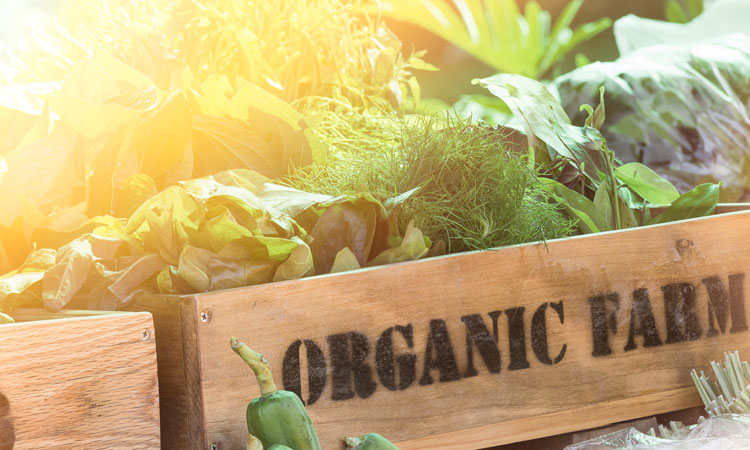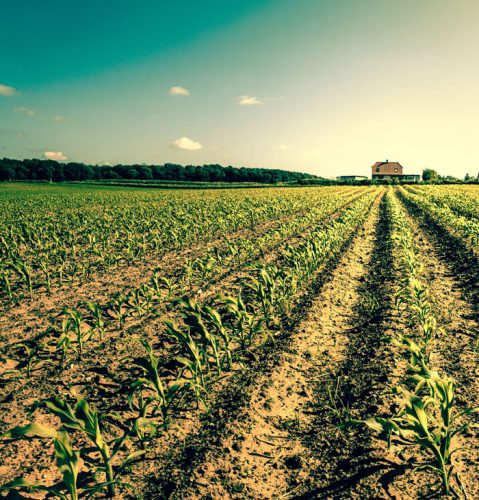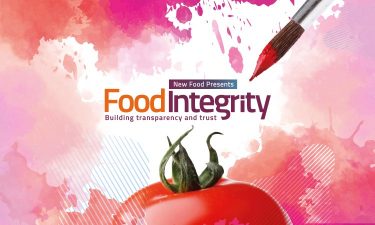Does organic come with integrity as standard?
- Like
- Digg
- Del
- Tumblr
- VKontakte
- Buffer
- Love This
- Odnoklassniki
- Meneame
- Blogger
- Amazon
- Yahoo Mail
- Gmail
- AOL
- Newsvine
- HackerNews
- Evernote
- MySpace
- Mail.ru
- Viadeo
- Line
- Comments
- Yummly
- SMS
- Viber
- Telegram
- Subscribe
- Skype
- Facebook Messenger
- Kakao
- LiveJournal
- Yammer
- Edgar
- Fintel
- Mix
- Instapaper
- Copy Link
Posted: 30 March 2020 | Bethan Grylls (New Food) | No comments yet
Ahead of his appearance at Food Integrity 2020, New Food speaks to Lee Holdstock of the Soil Association about how the organic food and drink systems operate…


“We live in a world where our food and drink supply chains have a degree of anonymity,” Lee Holdstock of the Soil Association told New Food. “Consumers do not have visibility into this chain – but I would argue that the Soil Association certification has been compensating for this by being the eyes and ears for those consumers.”
Holdstock is the senior business development manager for the Soil Association. His responsibility lies in trade and policy and he is also an advisory board member to the International Federation of Organic Agriculture Movement’s Integrity Alliance. His role in the association enables him to contribute to the wider global conversation around integrity through organic products.
“The exciting thing about being involved in these kinds of conversations is that we are already one of the most highly regulated areas of food and drink…we have done an awful lot of work to earn the trust of consumers.
“We have in the past used such strap lines as ‘food you can trust’ in the context of organic. The reason for our trust element is that we’ve had organic standards and certifications since 1973.”
However, Holdstock did note that as a tightly regulated area, the demands of organic are slightly higher.
“The more you are associated with trust, the harder you have to work to ensure that you can honestly deliver to the consumers’ expectations,” he explained. “We are interested in integrity, not just because of that additional onus that we have, but because the organic market is growing globally – very rapidly.”


Organic farming attempts to work with nature and reduce the farmer’s reliance on external inputs on-farm
Holdstock said there are several different factors that are driving growth in the organic market, but the growth has been steadily rising in the last four decades, particularly in Europe and North American.
He pointed to health as one of the main motivators for moving to organic, but also gave a nod to the numerous food scares the UK has experienced in the last 20 years. “People have stopped trusting food. Our recent survey showed that mistrust in food generally, and particularly in anonymous food businesses, is growing. Consumers are looking for an independent assurance.
“Greta Thunberg has also been encouraging people to make more planet-centric choices – and organic is equated with its plentiful sustainability benefits.”
However, according to Holdstock the industry is experiencing rapid growth. “We’re talking about a market which is currently worth $130 billion that could be as much or over $300 billion in five years.” The result of such growth is that supply chains are getting longer and more complicated, and despite the stringent and globally recognised standards, Holdstock admitted that there could be increased risk in peripheral areas. “To keep our promise, we need to be able to ensure that risk does not creep in.”
Consequently, the Soil Association is working with its certified businesses to look at additional ways beyond certification that will enable them to go the extra mile. Whether that means improving supply chain relationships, testing, product testing or other forensic tools, or information and communication technologies that could be employed.
“We are trying to eliminate that small risk loitering around the periphery; getting it to as close to zero-risk as possible. It will never be zero but helping to manage risks no matter how small is incredibly important to us.”
How does organic work?
“Fundamentally, organic tries to work with nature and reduce the farmer’s reliance on external inputs on the farm,” Holdstock explained. “If you’re familiar with concepts like the circular economy, organic can be compared to creating a circular economy within the internal farming system.”
Organic production specifies a ‘conversion period’ whereby the farmer must manage their land (and any animals) according to these standards for the required period of time before they can market their land or products as organic. This period is normally two years and enables the farmer to begin establishing organic management techniques, build soil fertility and biological activity.
If one can demonstrate they have managed their land according to the organic standards before entering conversion, there is scope to reduce this period by up to four months. This is rare, however, and subject to approval by Defra (the UK’s Department for Environment, Food and Rural Affairs).
Perennials will also require a further 12 months on top of the standard two-year period before the crop can be harvested as organic.
According to Holdstock, some of the businesses it works with are not solely devoted to organic, so the association is in conversation with them about how they can implement better manufacturing and business practices across their entire company, which will help to increase levels of integrity and lower risks. “We are looking at integrity from a much wider perspective than just organic.”
One example that Holdstock highlighted is the association’s work with Fair for Life, a CSR and fair-trade scheme. “It explores the relationships and conditions for everybody in the supply chain and we know that the quality of this relationship is a key driver for trust and can increase integrity!”
Pesticides
A small handful of pesticides are allowed in organic farming practices, which comprise very simple elements such as copper or sulphur. “They’re often used in much lower quantities and under special permission in those cases where a farmer has a real emergency,” Holdstock explained. “The key thing we don’t allow is synthetic, persistent pesticides that have ongoing, long-term effects on the environment in terms of toxicity or bioaccumulation.”
What Holdstock is concerned about is cocktails of pesticides. “The data from government tells us that the volumes being used are going down. But if the potency of those products is actually going up, then the fact the farmers are using less in terms of a tonnage is kind of irrelevant. Although we are assured we’re eating very low levels of pesticides, our concern is that we are consuming a mixture of lots of complex, synthetic pesticides and other agrochemicals, with no knowledge of what the effect might be on our health”
So, if synthetic agrochemicals have the potential to adversely affect our health, why use them in the first place?
“Farmers have been persuaded that in order to meet yields, they need to use synthetic chemistry. That starts you off in a direction that creates problems for you later down the line. The use of one chemical input can then necessitate the use of another, leaving the farmer increasingly dependent on such inputs. It might mean that you’ve expended so much of your farm planning and energy on buying those chemicals and using them, that you haven’t had time to encourage wildlife.
New dates for Food Integrity 2020 announced!


Join us on the 29-30 September at Twickenham Stadium, London, United Kingdom, to hear from speakers such as Lee Holdstock. Full agenda details are to follow very shortly!
“Not only can chemical fertilisers pollute watercourses, but there is also evidence to suggest that such fertilisers actually change the plant structure. We’ve seen evidence that suggests that if you use nitrates, synthetic nitric fertilisers, it can make the cell walls of plants thinner, which leaves them more vulnerable to pests and disease. The only way to deal with that is of course more chemicals.”
Holdstock gave a good analogy: “It is like going to a doctor and receiving pharmaceuticals for a condition because that’s the doctor’s preferred, and arguably easiest for them, way to treat you. Then sadly you develop side effects from those medicines, so you have to have more medicines to treat the side effects.
Why aren’t we all organic?
Today, 1.5 percent of UK food is organic, so the industry remains fairly modest. But if organic is better for our health, better for the planet and better for animals, why aren’t we all going organic? Holdstock said there is a number of reasons.
“It’s a big jump for farmers. Farmers, who potentially have gone through an agricultural education that is quite traditional and conventional, have been taught that using these agricultural inputs is the way to get the best yields.
If we’re eating very low level, but a mixture of lots of complex, synthetic pesticides and other agrochemicals, what is the effect on my health and your health?
“We have had a food system, since the creation of the common agricultural policy, which rewards farmers for the amount of produce it yields. The impact it has had on land and the consumer has not been something considered historically. We are now moving slowly towards a more enlightened view. Farmers are buying into other schemes and methodologies that aim to reduce any negative impact.
“Organic processes require radical change. You can’t just simply, for example, stop using pesticides if you’re not prepared to also work on improving your soil fertility and encouraging nature onto your farm.”
In the UK, Holdstock also said that going organic is not a governmental priority. But the association hopes that will change in the post-Brexit years. “We are starting to talk in government circles around using public money to support things that are good for the public. We see the way organic farms manage their land and the food they produce as definitely beneficial.”
Organic and fraud
According to Holdstock, the Soil Association carries out a far higher level of unannounced audits. “There is generally more scrutiny, so I think that helps to reduce risk. But, equally, we are not facing a major problem with fraud in the UK organic market at all. In fact, there have been very few cases of earlier fraud across Europe historically.
Although Holdstock does believe that organic holds temptation for fraudsters due to its higher price point, but he pointed out that the organic industry keeps a keen eye out for criminals. “If you have invested heavily in becoming an organic producer or company and you suspect someone else in the market is being dishonest, you’re going to report it.”
It is clear to see that organic is benefitting from a strictly regulated system, but is there a chance that regulation could go too far? “There is always a danger,” Holdstock admitted. “If you create more and more regulation, then there is a risk that you reduce flexibility for businesses. You make it too expensive for them to comply. In some instances, it will be counterproductive.
“But on the whole,” he continued, “I think it would be hard to argue that additional checks, balances and rules would result in a lower level of food safety. But integrity is so much more than that. Increasingly, consumers will consider a high integrity food product as one where they know it hasn’t had negative impact. I think more rules in that area are not necessarily the right thing in every instance; I believe that further transparency, visibility and accountability is the answer.”
Interested in reading more about organic? Check out our interview with Renée Elliott of Planet Organic.
Biography


Benefitting from more than 20 years of experience in food and textile business development, Lee Holdstock is a trusted expert in sustainability, responsible business and organics who manages a range of projects for Soil Association Certification – the UK’s biggest organic certifier. By helping hundreds of businesses build capability in marketing, communications, supply chain and routes to market, Lee’s team at Soil Association Certification actively support the growth of an organic market, now worth more than £2 billion a year.
Related topics
Clean Label, Environment, Food Safety, Health & Nutrition, Natural, Pesticides, Quality analysis & quality control (QA/QC), Regulation & Legislation, Supply chain, Sustainability
Related organisations
Department for Environment Food and Rural Affairs (Defra), International Federation of Organic Agriculture Movements, The Soil Association









